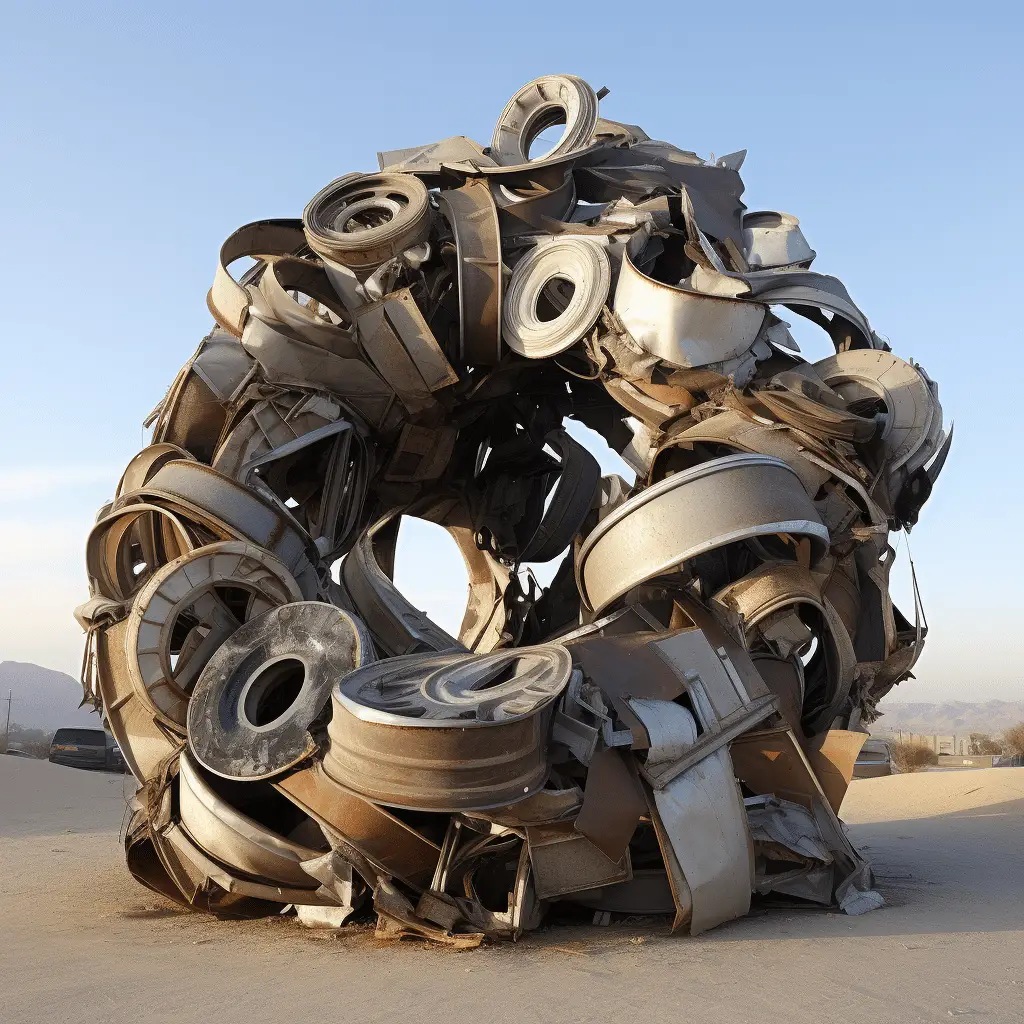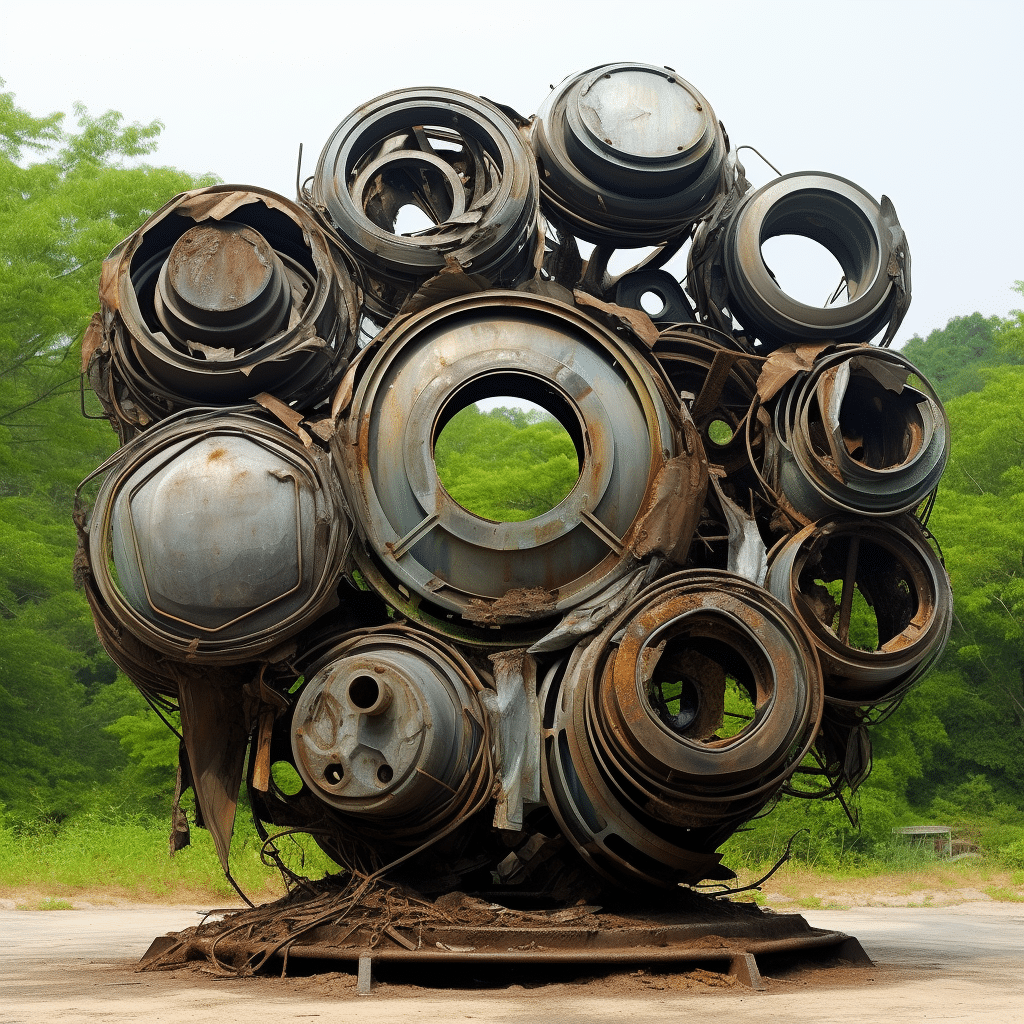Recycling Scrap Metal: A Green Energy Solution
Recycling scrap metal has numerous benefits for the environment, the economy, and sustainable construction. It not only reduces greenhouse gas emissions but also conserves energy, natural resources, and creates jobs. Additionally, using recycled metal instead of virgin ore reduces air and water pollution. However, there are challenges to consider, such as proper segregation and quality control, as well as the need for government support and investment in the recycling industry.
Key Takeaways
- Recycled metal usage offers significant benefits for the environment and the economy
- It reduces greenhouse gas emissions and conserves energy and natural resources
- Recycling metal creates job opportunities and contributes to sustainable construction practices
- Proper segregation and quality control are challenges that need to be addressed in the recycling industry
- Government support and investment are crucial for the growth of the recycling industry
Good for the Environment

Recycling scrap metal plays a crucial role in protecting the environment and mitigating the impact of pollution. By diverting metal waste from landfills, we free up valuable space and reduce the pollution caused by the decomposition of metal in these sites. But the benefits don’t stop there.
When it comes to greenhouse gas emissions, the impact of recycling scrap metal is significant. The Institute of Scrap Recycling Industries estimates that recycling metal can potentially reduce emissions by 300 million to 500 million tons. This reduction in emissions is due to the fact that producing new metal from mined ore emits a considerably higher amount of greenhouse gases compared to the recycling process.
Using recycled steel alone can lead to an astonishing 86% reduction in air pollution, a 76% reduction in water pollution, and a 40% reduction in water usage. These figures highlight the positive impact of recycling scrap metal on the quality of our air and water, making it an essential practice for maintaining a clean and sustainable environment.
Table: Reduction in Pollution by Using Recycled Steel
| Pollution Type | Reduction Percentage |
|---|---|
| Air Pollution | 86% |
| Water Pollution | 76% |
| Water Usage | 40% |
Recycling scrap metal is not only good for the environment but also for our overall well-being. By reducing pollution and conserving resources, we can contribute to a healthier and more sustainable future.
Conserves Energy
Recycling metal is not only beneficial for the environment but also plays a crucial role in conserving energy. The process of recycling scrap metal requires significantly less energy compared to producing new metal from raw materials. For instance, the recycling of steel consumes 60% less energy, while recycling aluminum saves a staggering 95% of energy. By choosing to recycle your scrap metal, you are contributing to energy conservation and reducing the reliance on new resources for metal production.
The conservation of energy through metal recycling has far-reaching benefits. Companies that engage in recycling practices can experience cost savings, which can ultimately result in cheaper products for consumers. Moreover, minimizing energy consumption contributes to the reduction of greenhouse gas emissions, leading to a cleaner and healthier environment. Supporting the recycling industry and actively participating in metal recycling initiatives can help us make significant strides toward achieving sustainable energy practices.
Energy Savings Comparison
| Metal | Energy Savings |
|---|---|
| Steel | 60% |
| Aluminum | 95% |
| Copper | 85% |
By recycling metals, we can conserve energy and reduce our carbon footprint. The energy savings achieved through metal recycling have a direct impact on mitigating climate change and promoting a sustainable future.
Furthermore, metal recycling helps in reducing the demand for new metal extraction, which requires significant energy and natural resource consumption. By reusing existing metal resources, we can alleviate the pressure on mining activities and protect our planet’s limited resources. Through our collective efforts in metal recycling, we can contribute to a more sustainable and energy-efficient future for generations to come.
Creates More Jobs
One of the significant benefits of metal recycling is its contribution to job creation and economic growth. The metal recycling industry employs over a million workers in the United States alone, making it a significant contributor to job opportunities. According to research, the metal recycling industry generates a staggering $236 billion annually, highlighting its economic significance. Compared to other waste disposal methods such as incineration or landfill, metal recycling creates 36 times more jobs, providing employment opportunities for many individuals.
Investing in the recycling industry not only supports the economy but also promotes competitive salaries and benefits for workers. By diverting metal waste from landfills and focusing on recycling, we can create a sustainable and thriving job market. This industry’s growth is a testament to the potential for economic benefits that metal recycling offers, making it a valuable asset for both the environment and the workforce.
To further underscore the economic potential, let’s take a look at the job creation comparison:
| Metal Recycling | Incineration | Landfill Disposal | |
|---|---|---|---|
| Jobs Created | 36 times more | Less job creation | 6 times more |
The table depicts the significant job creation potential of metal recycling compared to other waste disposal methods.
By prioritizing metal recycling and supporting its expansion, we can foster a sustainable and prosperous economy while reducing the environmental impact caused by metal waste disposal.
Can Earn You Money
Scrap metal recycling is not just an environmentally responsible practice; it can also put some extra cash in your pocket. By selling your scrap metal to reputable scrap yards or recycling companies, you can turn your unwanted metal items into a valuable commodity. Different metals have varying values, with non-ferrous metals like aluminum and copper generally worth more than ferrous metals like iron and steel. It’s important to do your research and determine the current market prices for the specific metals you have.
Once you’ve identified the valuable metals in your possession, you can start locating scrap metal buyers in your area. Many scrap yards and recycling centers accept a wide range of metal materials and offer competitive prices based on the weight and quality of your scrap. Some businesses even provide pickup services, making it convenient for you to sell your scrap metal without the hassle of transportation.
By taking advantage of the opportunity to recycle your scrap metal for money, you not only contribute to the recycling efforts but also declutter your space and make some extra income. It’s a win-win situation that combines environmental responsibility with financial benefits. So start gathering your scrap metal items, find your nearest scrap yard, and turn your unwanted metal into cash.
| Metal Type | Price per Pound ($) |
|---|---|
| Aluminum | 1.50 |
| Copper | 3.00 |
| Brass | 1.25 |
| Iron | 0.10 |
| Steel | 0.08 |
Frees Up Your Space
Recycling your scrap metal not only benefits the environment but also frees up valuable space in your home or workplace. Scraps of metal take up space in garages, sheds, and yards, often serving no purpose if stored indefinitely. By recycling your scrap metal, you can create more space and reduce clutter. It is essential to know what materials can be sold as scrap and locate suitable buyers to ensure you receive a return for your recycling efforts.
When it comes to optimizing space, proper organization is key. By recycling your scrap metal, you can declutter your surroundings and make the most of your available space. Instead of letting unused metal items accumulate, consider selling them as scrap and create a more streamlined environment.
The Benefits of Space Optimization
Optimizing your space through scrap metal recycling offers several advantages. Firstly, it allows you to efficiently utilize your living or working area, making it more functional and visually appealing. By removing unnecessary metal items, you can create a cleaner and more organized space, making it easier to find and access the things you need.
Secondly, space optimization contributes to a safer environment. Cluttered spaces can increase the risk of accidents such as tripping or falling. By recycling scrap metal and freeing up space, you can help minimize these hazards and create a safer living or working environment.
Lastly, space optimization can have a positive impact on your mental well-being. A cluttered space can lead to feelings of stress and overwhelm, while an organized and tidy environment promotes a sense of calm and focus. By recycling your scrap metal and decluttering your space, you can create a more peaceful and productive atmosphere.
| Benefits of Space Optimization |
|---|
| Efficient utilization of living or working area |
| Reduces the risk of accidents |
| Promotes mental well-being and productivity |
Overall, recycling your scrap metal not only benefits the environment but also offers the opportunity to optimize your space. By selling your unwanted metal items as scrap, you can create a cleaner, safer, and more organized living or working environment. Take the first step towards space optimization by identifying your scrap metal items and finding suitable buyers for a win-win solution.
Conserves Natural Resources
Recycling metals plays a crucial role in conserving natural resources and protecting our environment. By reducing the need for new metal extraction, metal recycling helps minimize the negative impact of mining on our planet. This sustainable practice not only saves valuable resources but also reduces water usage and the generation of mining waste.
Through metal recycling, we can significantly reduce the consumption of water and energy required for extracting metals from raw materials. For example, recycling steel saves 60% of the energy compared to producing it from scratch, while recycling aluminum saves a staggering 95% of energy. These energy savings contribute to a more sustainable future and decrease our dependence on new resource extraction.
In addition to energy and water conservation, metal recycling also reduces air and water pollution. By preventing the need for mining and ore processing, we can minimize the release of harmful chemicals and pollutants into the environment. Recycling metals helps us protect ecosystems and preserve the quality of air and water resources for future generations.
| Metal Recycling Benefits | |
|---|---|
| Conservation of natural resources | Reduces the need for new metal extraction |
| Energy conservation | Significantly reduces energy consumption compared to producing new metal |
| Water conservation | Minimizes water usage in the metal production process |
| Pollution reduction | Decreases air and water pollution associated with mining and ore processing |
Metal recycling is a sustainable practice that offers significant environmental benefits by conserving natural resources and reducing pollution. By actively participating in metal recycling initiatives, we can contribute to a cleaner and greener future for our planet.
Metal Can Be Recycled Endlessly
Recycling metals is not only environmentally beneficial but also offers the advantage of endless recycling. Most metals can be recycled an unlimited number of times, making metal recycling a sustainable practice. While there may be a slight decrease in quality over time, the recycling process allows for continuous reuse of metals, significantly reducing the need for new metal production and minimizing resource extraction.
One of the key benefits of endless metal recycling is the conservation of natural resources. By recycling metals, we minimize the need for mining and the associated environmental impact. This practice helps protect our planet for future generations by reducing water usage and minimizing the generation of mining waste.
Moreover, endless metal recycling contributes to the sustainability of the metal industry. It promotes a circular economy where materials are reused rather than discarded, leading to reduced energy consumption and greenhouse gas emissions. By actively participating in metal recycling efforts, we can all play a part in preserving our environment and conserving valuable resources.
Benefits of Endless Metal Recycling:
- Minimizes the need for new metal production
- Reduces energy consumption and greenhouse gas emissions
- Conserves natural resources and minimizes water usage
- Promotes a circular economy and sustainable practices
By recognizing the endless recycling potential of metals and incorporating recycling practices into our daily lives, we can make a significant impact on the sustainability of our planet. Whether it’s through household recycling or supporting metal recycling industries, each individual contribution adds up to create a brighter and greener future.
| Metal Type | Recycling Potential |
|---|---|
| Steel | Infinitely recyclable |
| Aluminum | Infinitely recyclable |
| Copper | Infinitely recyclable |
| Brass | Infinitely recyclable |
| Iron | Infinitely recyclable |
Endless Metal Recycling Options
Recycling metal is not limited to large corporations; homeowners can also play a vital role in metal recycling efforts. By recycling household items and appliances made of metal, we can contribute to a more sustainable future. Many cities now have dedicated scrap metal recycling areas, making it easier for individuals to dispose of their metal waste responsibly.
For those looking to sell their scrap metal, there are specialized companies and scrap yards that buy various types of metals. It’s essential to identify the metals you have and research their values to ensure you get a fair price when selling them. Selling your scrap metal not only benefits the environment but also provides a financial incentive, allowing you to declutter your space while earning some extra cash.
When recycling metal at home, it’s important to know what materials can be sold as scrap and locate suitable buyers. Some common household items that contain valuable metals include electronics, kitchen appliances, and even decorative items. By identifying and recycling these items, you can not only contribute to recycling efforts but also optimize the use of space in your home or workplace.
Table: Types of Household Items Suitable for Metal Recycling
| Item | Metal Type |
|---|---|
| Old Electronics | Gold, Silver, Copper |
| Kitchen Appliances | Steel, Aluminum |
| Decorative Items | Brass, Copper |
| Plumbing Fixtures | Brass, Copper |
Recycling metals in our homes and communities not only helps conserve natural resources but also reduces the amount of metal waste ending up in landfills. By actively participating in metal recycling, we can take advantage of the benefits it offers and contribute to building a more sustainable future for generations to come.
How to Recycle Your Scrap Metal for Money

If you have scrap metal lying around and want to make some extra money while contributing to recycling efforts, you can easily recycle your scrap metal for cash. Here are some steps to help you get started:
1. Identify valuable metals:
Begin by identifying the type of metals you have in your possession. Common household items like old appliances, wires, plumbing fixtures, and car parts may contain valuable metals such as aluminum, brass, copper, iron, and steel. Separate and sort the metals to determine their individual worth.
2. Research metal values:
To ensure you get a fair price when selling your scrap metal, research the current market values for different metals. Metal prices can fluctuate, so it’s essential to stay informed about the current rates. You can find reliable pricing information online or consult with local scrap yards or metal recycling companies for guidance.
3. Find the right buyer:
Once you know the types of metals you have and their market value, look for scrap yards or companies that specialize in buying and recycling scrap metal. Make sure to choose a reputable buyer who offers competitive prices for your materials. Verify their credentials and inquire about any specific requirements they may have regarding the condition or preparation of the scrap metal.
4. Prepare and sell your scrap metal:
Before selling your scrap metal, prepare it for sale by removing any non-metal elements like plastic, rubber, or insulation. Clean the metal if necessary to improve its appearance and value. Then, contact your chosen buyer, arrange for the sale, and deliver the scrap metal to their facility. Be sure to keep track of the weight and type of metal you’re selling to ensure an accurate transaction.
By following these steps, you can responsibly recycle your scrap metal and potentially earn some money in the process. Remember to prioritize safety and handle sharp or heavy metals with care to avoid any accidents. Selling your scrap metal not only benefits the environment but also provides a practical way to declutter your space and contribute to the circular economy.
| Metal Type | Estimated Value (per pound) |
|---|---|
| Aluminum | $0.50 – $1.00 |
| Brass | $1.50 – $2.50 |
| Copper | $2.50 – $3.50 |
| Iron | $0.05 – $0.10 |
| Steel | $0.03 – $0.07 |
Conclusion
The benefits of recycled metal usage and scrap metal recycling are significant. By embracing sustainable practices and actively participating in recycling efforts, we can make a positive impact on the environment while contributing to a more sustainable economy. Recycling scrap metal offers numerous advantages, including reducing greenhouse gas emissions, conserving energy and natural resources, creating jobs, and even earning money.
Through the recycling process, we can reduce pollution, conserve energy, and minimize the need for new metal extraction. Recycling metals not only frees up valuable space in our homes and workplaces but also helps protect our planet for future generations. Moreover, the endless recycling capability of metals ensures their continuous reuse, thereby minimizing the need for new metal production and further promoting sustainability.
While challenges exist, such as proper segregation and the need for government support, the benefits of recycling metals far outweigh the drawbacks. By recognizing the value of scrap metal and actively participating in proper recycling practices, we can contribute to a more sustainable future. So let’s embrace the power of recycling and make a difference by promoting the usage of recycled metal and embracing sustainable practices in our daily lives.
FAQ
What are the benefits of recycling scrap metal?
Recycling scrap metal reduces greenhouse gas emissions, conserves energy and natural resources, creates jobs, and can even earn you money.
How does recycling scrap metal help the environment?
Recycling scrap metal reduces pollution, conserves resources, and frees up space in landfills.
Does recycling metal conserve energy?
Yes, recycling scrap metal requires less energy compared to producing new metal from raw materials.
How does recycling metal create job opportunities?
The metal recycling industry generates billions of dollars in revenue and employs over a million workers in the United States.
Can I earn money from recycling scrap metal?
Yes, scrap yards are willing to buy various types of metal, and selling your scrap metal can provide a financial incentive.
Does recycling scrap metal free up space in my home or workplace?
Yes, recycling your scrap metal can create more space and reduce clutter in your home or workplace.
How does recycling metal conserve natural resources?
By recycling metal, we minimize the need for new metal extraction, which consumes precious natural resources like water.
Can metal be recycled endlessly?
Most metals can be recycled an unlimited number of times, contributing to the sustainability of the metal industry.
How can I recycle scrap metal from my home or community?
Many cities have dedicated scrap metal recycling areas, and individuals can sell their scrap metal to specialized companies.
How can I recycle my scrap metal for money?
Identify valuable metals in common household items, research their values, and find suitable buyers to sell your scrap metal.




